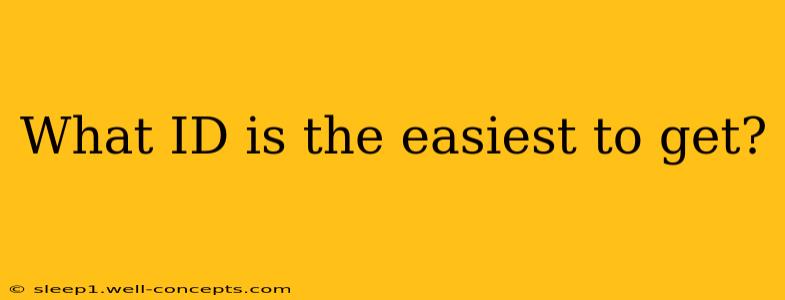What's the Easiest ID to Get? A Guide to Understanding Identification Documents
The question of "what's the easiest ID to get?" is complex and depends heavily on your circumstances and location. There's no single universally "easy" ID, as each document requires meeting specific eligibility criteria and undergoing a verification process. Attempting to obtain identification fraudulently is a serious crime with severe consequences. This guide will explore various identification documents and the general requirements for obtaining them, helping you understand the process without encouraging illegal activity.
Understanding the Importance of Proper Identification
Before diving into specific IDs, it's crucial to emphasize the importance of legitimate identification. IDs are essential for various life functions, including:
- Banking and Financial Transactions: Opening bank accounts, applying for loans, and managing finances.
- Employment: Verifying identity for employment applications and background checks.
- Voting: Exercising your right to vote in elections.
- Travel: Domestic and international travel often requires identification.
- Access to Services: Accessing healthcare, government services, and other essential resources.
Common Identification Documents and Their Acquisition:
The ease of obtaining an ID varies significantly based on your current status and location. Here's a breakdown of common identification documents:
1. State-Issued Driver's License or Identification Card:
- Eligibility: Generally requires residency in the issuing state, passing a vision test (for driver's licenses), and potentially a driving exam (for driver's licenses).
- Process: Requires an application, proof of residency (utility bills, lease agreement), and potentially other documents like a birth certificate or Social Security card.
- Ease: Relatively straightforward for residents meeting the requirements. The process can vary slightly by state.
2. State-Issued Identification Card (Non-Driver):
- Eligibility: Similar to a driver's license but doesn't require driving tests.
- Process: Generally involves an application, proof of residency, and possibly other supporting documents.
- Ease: Often considered easier than obtaining a driver's license, as it bypasses driving-related requirements.
3. Passport:
- Eligibility: Requires citizenship of the issuing country.
- Process: Involves an application, proof of citizenship (birth certificate, previous passport), and potentially an interview.
- Ease: Can be more involved than state IDs, requiring more documentation and potentially longer processing times.
4. Social Security Card:
- Eligibility: Requires a Social Security number (SSN), which is assigned at birth or upon arrival in the U.S. Individuals may apply for an SSN card to replace a lost or damaged one.
- Process: Application process involves providing proof of identity and citizenship or legal immigration status.
- Ease: Obtaining an initial SSN is tied to the process of establishing legal presence. Replacing a lost card generally involves less extensive paperwork.
5. Military ID:
- Eligibility: Requires active or veteran status in the military.
- Process: Issued by the respective branch of the military.
- Ease: Relatively easy to obtain for eligible individuals.
Important Considerations:
- Legal Residency: Most identification documents require proof of legal residency or citizenship.
- Documentation: Be prepared to provide supporting documents such as birth certificates, proof of address, and other relevant information.
- Fees: There are usually fees associated with obtaining identification documents.
- Time: Processing times vary, so be prepared for potential delays.
Conclusion:
There is no single "easiest" ID to obtain. The best approach is to determine which ID is most appropriate for your needs and then follow the legal and documented processes for acquiring it. Attempting to circumvent these processes is illegal and carries severe consequences. It’s always best to obtain identification legitimately through the official channels provided by your local or national government.

